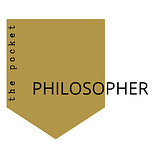**Have you heard the big news? Make sure to check out our special announcement and opportunity to earn a special gift from Matt @ TPP!
And if you’re ready, check out how to include your friends using the button below:
Fellow philosophers,
I hope you’re having a great start to the week!
Yesterday, I had the opportunity to write a guest post for my friend Corey and his small business Nashville Nutrition and Strength.
It was really enjoyable to prepare, and there was much more to learn than I initially expected. I hope you all enjoy it and find it valuable!
Make sure to leave a comment to let us know what you think about mental health, fitness, and the philosophical path toward holistic well-being!
Everything we hear is an opinion, not a fact. Everything we see is a perspective, not the truth.
― Marcus Aurelius , Meditations
For many of us, to hear that something is Stoic is to assume it is devoid of passion, heartless, or lacking in emotion.
In reality—and from a philosophical perspective—nothing could be further from the truth.
At its core, Stoicism is an art and discipline with deep roots in both ancient Greece and Rome. It’s a philosophy which managed to inspire thousands of enslaved peoples, guide one of the most powerful emperors in history, and discipline legions of warriors throughout history.
In many ways, Stoicism is such a well-worn philosophy that it has become nearly universal in its application.
One of the earliest Stoics named Epictetus began his life, in fact, enslaved. And it was during his time of bondage (historians believe and legend tells us) that Epictetus would suffer a debilitating injury, one that would remain with him for the rest of his life.
And yet, Epictetus saw his injury and its physical limitations not as a hindrance, but rather the path toward uncovering the depths of the self, of his potential, and ultimately his happiness.
In her book Stoic Warriors author Nancy Sherman notes,
“The Stoics argue that human flourishing—that is, our happiness or wellbeing (what the Greeks call eudaemonia)—is not a matter of the state of one’s body, even its global condition being healthy or diseased. Rather, as I have noted before, the body and its states constitute what the Stoics call ‘indifferrents,’ that is, external goods, outside our full control, to which happiness is indifferent, so to speak.”
To be honest, this is a lot, and it’s also quite counter-intuitive to the way many of us are conditioned to feel about our bodies.
I don’t know about you, but I grew up in a culture of micro- and not so micro-aggressions against people who were not “fit.”
Those standards were always in flux, but seemed to reflect culture trends and dominant ideology rather than objective measures of health.
What I’ve seen is an inversion of the equation that ought to lead to our happiness—at least according to Stoic philosophers.
You see, as Sherman notes above, the Stoics saw the body not as something to be ultimately identified with, but as external to the deeper identity and happiness which one harbors.
To put it another way, happy people care for and love their bodies. Miserable people use their bodies to seek happiness—often without ever finding satisfaction.
On one end of the spectrum we might think of things we’d consider clinical diagnoses like eating disorders or body image distortions. In these instances, people can have difficulty seeing their bodies objectively, and instead project deep feelings of inadequacy, often rooted in trauma, onto their physical self image.
But, perhaps closer to those of us who don’t identify with these symptoms, we quietly and secretly judge our body’s aesthetics. We watch our bodies age and change and secretly resent the passage of time.
We quietly envy the perfectly manicured bodies of athletes and youthful people, internalizing a sense of lack or inadequacy. A certain type of body image standard has taken over the world—an image which has no respect for personal history, identified gender, personal preference and goals, or inherent beauty.
And this subtle, subversive slant toward the perfectly chiseled ab or neatly cut tricep eats away at our happiness. We are sold the lie everyday that at least in part, our bodies lead to our happiness.
But the wisdom of old is that this formula is actually upside down. That the formula of the modern world might be creating an epidemic of self-hate, confusion, and unsustainable health practices for a short term ascetic return.
This lie at the core of the modern body standard confuses us about what healthy and happy people actually look like.
I waited for months before I finally started training with Corey and Nashville Nutrition and Strength because the only grid I had for fitness were stored memories of grueling 4 hour workouts as a lifelong competitive gymnast. These memories were coupled with flashbacks to the punishing monotony of Army physical fitness or hyper-competitive athletics at West Point.
Deep down, this pattern of fitness and health taught me two things that have done much more harm than good:
Fitness only counts if it hurts, if it’s really hard and exhausting every single time
I’ll never be good enough, there is always someone fitter, stronger, faster, leaner, and better conditioned than I am.
The only real salve to this open wound was to push harder, faster, and more intense than the last time.
While this mentality accomplished some short-term goals and led to some (temporarily) exciting returns, ultimately it left me near 30 years old with aches I shouldn’t be having when I was 70 let alone still in my 20s.
And for what? Was I any happier?
And so now I’m choosing the way of the ancients, the path of the Stoic Warriors.
This time, I’m not a warrior for this cause or that team. Rather, as Paulo Cohelo famously penned, I’m training to become a “Warrior of Light.”
As I learn to love myself, to know myself, and care for myself I’m learning to extend that to my body.
In my new found happiness and centeredness (largely based on the ancient practices of Stoicism, Buddhism, and mindfulness) I am now extending that to my health and fitness.
To put it another way: my body is now an extension of happiness, not the other way around.
It’s not about “crushing it” anymore, it’s about taking care of my body so it can still enable the things I love when I’m 50, 60, maybe even 106?
As an ancient Japanese proverb reminds us, “Walk slowly, and you’ll go far.”
Thanks for reading friends, until tomorrow!
Matt















Share this post